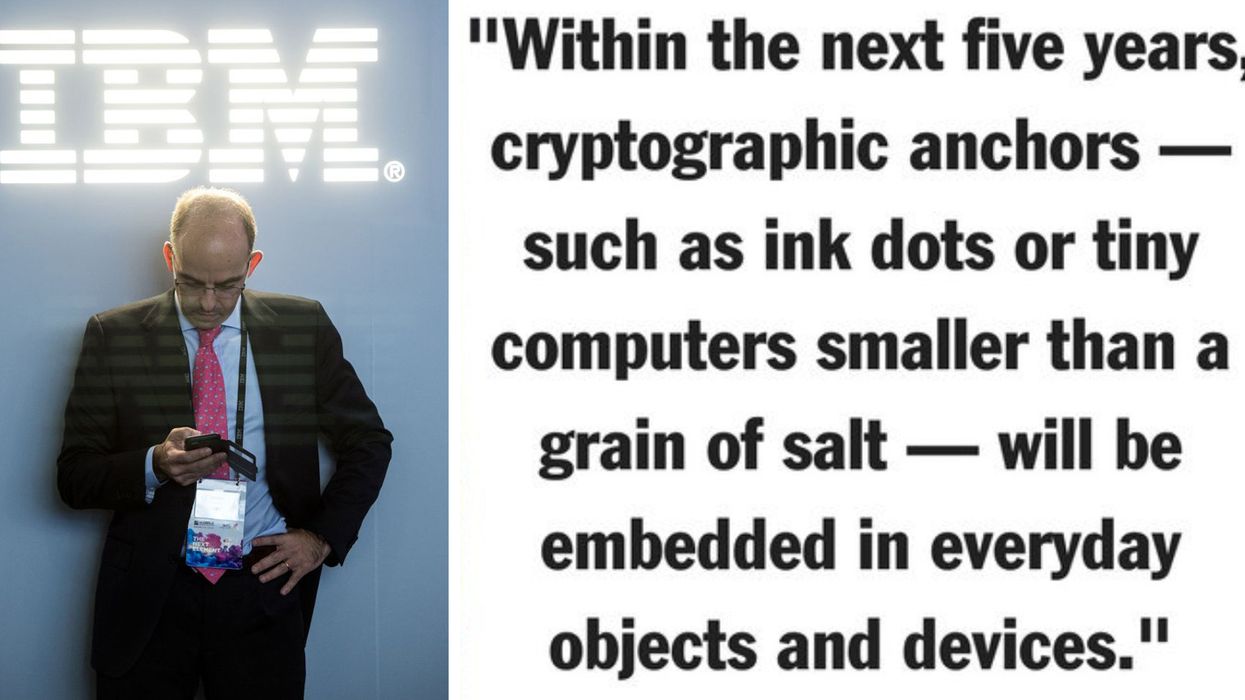Kicking off their Think 2018 expo in Las Vegas on Monday, computer giant IBM unveiled what it hails as the world's smallest computer.
It's roughly the size of a grain of salt or sand, and contains hundreds of thousands of transistors, which IBM claims will enable it to "monitor, analyze, communicate, and even act on data."
Still only a prototype, the chip will cost less than $.10 to manufacture. It's primary function will be for blockchain tracking—which means crypto-currency traders should be really excited.
"This computer will be a data source for blockchain applications. It's intended to help track the shipment of goods and detect theft, fraud, and non-compliance," according to Mashable. "It can also do basic AI tasks, such as sorting the data it's given."
Despite its small size, IBM's new computer, which really is a true "micro chip," will have similar processing power to Intel's x86 microprocessor from the early 1990's. Essentially, you could run and play the original Doom on it.
Though maybe not super impressive by today's computing standards, IBM's salt-sized computer, known as a cryptographic anchor, is a harbinger of future hardware that will be used in most, if not all electronics in the coming years.
"Within the next five years, cryptographic anchors — such as ink dots or tiny computers smaller than a grain of salt — will be embedded in everyday objects and devices," said Arvind Krishna, head of IBM research.
Microscopic computers have the potential to do more than track Bitcoin and improve smart phone performance, however. One of IBM's most innovative and groundbreaking ventures is the development of quantum computers, which, in theory, have the potential to yield nearly limitless computing power.
In five years, quantum computing will be used extensively by new categories of professionals and developers to solve problems once considered unsolvable," says IBM. "Quantum will be ubiquitous in university classrooms, and will even be available, to some degree, at the high school level."
Unlike their binary-based predecessors, quantum computers run on the principles of quantum entanglement and the interactions between subatomic particles. In October 2017, a team of Chinese scientists successfully teleported information between entangled particles under water—sharing information between entangled particles makes hacking impossible because the information itself doesn't travel through space. This has enormous implications for the future of cyber-security and ultra-secure communication.
IBM's lattice cryptography is one of the latest developments in the quest to engineer unhackable computers.
"No computer can crack it, not even future quantum computers," writes IBM. "With lattice cryptography we can work on a file, or encrypt it, without ever exposing sensitive data to hackers."
Also of note, IBM introduced their TrueNorth Chip, which has the capacity to imitate the vastly complex calculations performed by the human brain. This is a giant leap forward in the race to develop artificial intelligence.














 @DuncanCecil/X
@DuncanCecil/X @@realDonaldTrump/Truth Social
@@realDonaldTrump/Truth Social @89toothdoc/X
@89toothdoc/X @xray_media/X
@xray_media/X @CHRISTI12512382/X
@CHRISTI12512382/X
 @sza/Instagram
@sza/Instagram @laylanelli/Instagram
@laylanelli/Instagram @itssharisma/Instagram
@itssharisma/Instagram @k8ydid99/Instagram
@k8ydid99/Instagram @8thhousepath/Instagram
@8thhousepath/Instagram @solflwers/Instagram
@solflwers/Instagram @msrosemarienyc/Instagram
@msrosemarienyc/Instagram @afropuff1/Instagram
@afropuff1/Instagram @jamelahjaye/Instagram
@jamelahjaye/Instagram @razmatazmazzz/Instagram
@razmatazmazzz/Instagram @sinead_catherine_/Instagram
@sinead_catherine_/Instagram @popscxii/Instagram
@popscxii/Instagram
